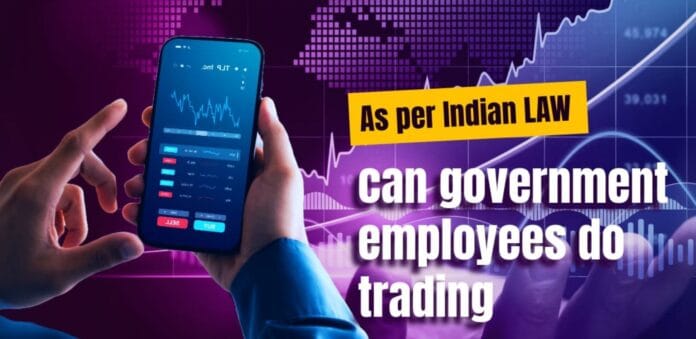The demand for stock market investing is rising in India. People of all ages can invest in the stock market to increase their wealth. But the primary query that comes up in relation to government workers is can government employees do trading?
Can Government Employees Do Trading?
Government employees are not allowed to trade in the stock market, as outlined in Section 16 of the Central Civil Services rules.
This regulation applies to all government workers, whether they are employed by the central government, state governments, or union territories. The rule clearly prohibits them from engaging in speculative activities involving stocks, commodities, or bonds.
In simple terms, trading refers to the frequent buying and selling of assets like stocks and bonds, often with the aim of making quick profits.
The rule categorizes trading as speculation, which implies taking high risks in the hope of financial gains. Since speculation is inherently risky, government employees are strictly barred from such activities to maintain financial discipline and integrity in public service.
By adhering to these rules, government employees can focus on their duties without conflicts of interest or ethical concerns. While investing is not entirely prohibited, any form of speculative trading is off-limits for those serving in public offices
Can a Government Employee Open a Demat Account?
As previously stated, there are restrictions on a government employee’s ability to invest in the stock market, regardless of whether they work for the federal government or the state government.
Currently, opening a demat account is required in order to invest in the stock market. As a result, a government employee can invest in the stock market by opening a demat account.
Can Government Employees Do Trading as Per Central Civil Services (Conduct) Rules 1964?
Conclusion
Government employees at the federal or state level can invest in the stock market but must avoid speculative activities.
They face restrictions on day trading and frequent trades. However, they can make long-term investments in stocks, bonds, mutual funds, and similar assets, provided qualified professionals handle these investments.
You must properly comprehend the distinction between trading and investing in the stock market before you begin making investments.
Additionally, make sure to review the relevant regulations, such as the SEBI (Prohibition of Fraudulent and Unfair Trading Practices) Regulations and the Central Civil Services (Conduct) Rules.
